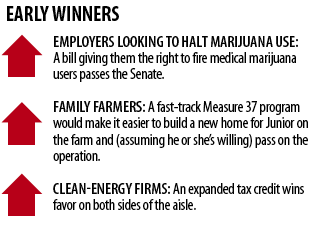 The Oregon Legislature heads into what should be its final two months, with leaders calling for a late June adjournment. A few business-related bills flying just below the radar could pop up for floor votes in the last wave of activity.
The Oregon Legislature heads into what should be its final two months, with leaders calling for a late June adjournment. A few business-related bills flying just below the radar could pop up for floor votes in the last wave of activity.
 By Oakley Brooks By Oakley Brooks |
The Oregon Legislature heads into what should be its final two months, with leaders calling for a late June adjournment. A few business-related bills flying just below the radar could pop up for floor votes in the last wave of activity.
Keep an eye on the corporate minimum
Business interests successfully kept an increase in the corporate minimum tax out of the rainy-day fund legislation, which Gov. Ted Kulongoski signed into law in March. But don’t count the corporate minimum raise dead yet: Both parties support it. House Minority Leader Wayne Scott (R-Canby) pairs the tax hike with his desired reduction in estate taxes (or, if you prefer, death taxes). Democrats would still like to deliver a corporate minimum hike to show they’re willing to stand up to tax dodgers. And the most recent proposal also raises $150 million in new revenue.
Lawmakers think voters stand behind them on this issue. Most Oregonians still remember the $10 minimum tax that billion-dollar outfits Portland General Electric and Louisiana Pacific (then headquartered in Portland) paid during the last recession.
Business groups realize there’s an image problem with the current $10 minimum, paid in years that companies report a loss. “We need to reverse this perception that business isn’t paying its fair share of taxes,” says Bernie Bottomly, of the Portland Business Alliance.
The most recent corporate minimum proposal, which appeared briefly in the rainy-day fund bill, would have set the minimum at $50,000 for companies with revenues over $25 million. And business groups worry that companies with high-cost inventory but low margins would be hit hard by this — potentially paying more in lean years to meet the corporate minimum than they pull down in profits. According to the PBA, 640 companies are projected to post revenues of $25 million or more in 2007 and would pay the minimum. Although neither the PBA nor individual industry groups have crunched the numbers on who these companies are, anecdotal evidence suggests they are dealers in high-priced inventory — jewelry, cars and machine tools, among others. At least 150 Oregon car dealers take in revenues of $25 million or more. “Many of these guys aren’t making much money,” says Greg Remensperger of the Oregon Automobile Dealers Association.
 “That top amount is just punitive if you lost money that year,” Bottomly adds. “There’s room to make a change on the $10 minimum but we’re not interested in discussions about another $150 million in revenue.”
“That top amount is just punitive if you lost money that year,” Bottomly adds. “There’s room to make a change on the $10 minimum but we’re not interested in discussions about another $150 million in revenue.”
Microbrews, macrotax?
This year’s Legislature has the best chance of any in recent memory of passing a beer tax, and the state’s storied microbrewers are nervous, even though lawmakers are trying to carve out exceptions for them. The tax hike has typically died in the House, where the powerful beer and wine distributors lobby (yes, the one that paid for those Hawaii trips by legislators) had allies in the Republican majority. With the Dems in control, at least three bills propose a hike on beer tax and one includes a new wine tax. The steepest proposal would move the tax on brewers from less than a penny per bottle to more than 10 cents. The money raised would be earmarked for drug and alcohol treatment. That bill, sponsored by Rep. Jackie Dingfelder (D-Portland) and Sen. Bill Morrisette (D-Springfield) also leaves small breweries untaxed.
The provision ostensibly avoids harming Oregon’s craft breweries, which are now a $2 billion-a-year economic engine and have turned beer into a tourist draw. But craft brewers are still adamantly against this bill. Oregon’s three biggest craft brewers, Widmer Brothers Brewing, Deschutes Brewery and Pyramid’s Portland brewery, all fall above the bill’s small-brewery threshold and would be subject to the new tax. More importantly, any tax — regardless of the carve-out for craft brewers — would raise the overall beer price in Oregon and ultimately hurt local breweries, says Kurt Widmer of Widmer Brothers. “Wholesalers and retailers will spread the cost increase over all their products,” Widmer says. “There’s really no way to protect us.”
Despite the stakes in this fight, Widmer and other craft brewers have not hired lobbyists, deciding to make personal visits to Salem. “I think we’re our own best lobbyist on this one,” Widmer says.
Tapping the Columbia
Two months ago, we wrote about several efforts to get more water out of the Columbia River for Eastern Oregon farmers [WATERWORKS, FEBRUARY]. Those pieces of legislation hit some early speed bumps: The Umatilla tribes, the governor and an array of environmental groups oppose the “Oasis Project” bill, which calls for removing an extra 500,000 acre-feet of water year-round, including during salmon runs. Three water-related bills from Sen. David Nelson, the GOP farmer from Pendleton, were held up behind renewable energy legislation. Nelson also supports the Oasis bill. The tribes and the governor support the Nelson effort that seeks authorization to fund a comprehensive water study. The Oasis bill was heard by the House Energy and Environment Committee in mid-April, which forwarded it to a work session, and Nelson’s water study bill moved to Way and Means. Keep your water map handy as these issues play out.
Have an opinion? E-mail [email protected]


